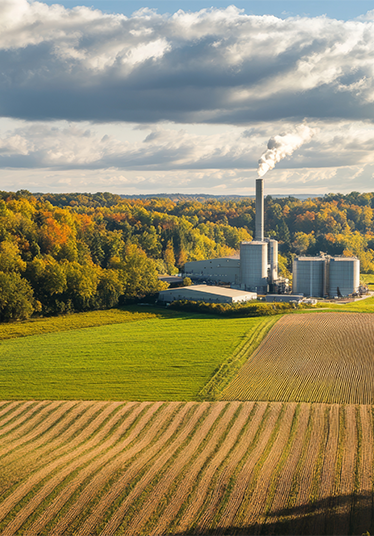
Biomass Innovation & Business
Overview
| Module Code | BSEN40620 |
| Module Title | Biomass innovation & business |
| Subject Area | Biosystems Engineering |
| Credits | 5 |
| NFQ | 9 |
| EFQ | 7 |
| Start Date | 20th January 2026 |
| Time | Synchronous online classes recorded. Students can follow asynchronously. 2 hours contact time / week. Time TBC |
| Duration | 12 weeks |
| Mode of Delivery | Online |
| Lead Academic | Dr. Ronald Halim |
| Fee | Full Fee: €895 |
| Application Deadline | Register your interest at: (opens in a new window)microcredentials@ucd.ie |
This module will examine biorefinery systems for the production of bio-based products and bioenergy from a range of feedstock. Unit operations associated with pre-treatment, processing and separation/post-treatment steps will be reviewed. Various thermochemical, biological, and chemical pathways for the conversion of biomass into bioenergy will be critically analysed, particularly in terms of sustainability and commercial viability. A number of national and EU biorefinery projects currently being led or carried out at UCD (e.g. in grass biorefinery, in microalgae fuel production) will be presented by scientists carrying out the research, enabling cross fertilization of ideas and enrichment of classroom learning. In addition, the module will consider innovation and market development challenges to bioeconomy implementation, integrating classroom learning into development of a bio-based product of choice. The module will culminate in the development of a business plan for the said bio-based product and a mock business pitch in front of a team of academics and industry representatives.
Key Features
Science and engineering students interested in biotechnology, sustainability and business; industry professionals looking to expand their knowledge of biomass use and sustainable bio-energy; and entrepreneurs aiming to enhance their knowledge in bio-economy.
Learning Outcomes:
On successful completion of this module, the student should be able to:
- Define and evaluate a biorefinery in terms of efficiency, energy balance and mass balance
- Describe conversion technologies for the production of bioenergy from a range of feedstock and critically assess their sustainability and entry barrier
- Describe and assess key conversion technologies for the production of biobased products from a range of feedstock and determine their challenges and market opportunities
- Analyse the impact of innovation and entrepreneurship in supporting the development of the bioeconomy
- Develop a business plan and presentation pitch for a bio-based product of choice in a group setting, simulating seed-funding process by venture capitalists
Indicative Module Content:
1. Biorefinery Process
- Overview of the bioeconomy and biorefinery
2. Business Plan and Presentation
- Value proposition
- Business model canvas
- Scoping exercise for a bio-based product
- Writing a business plan
3. Biomass-to-bioenergy
- First generation vs second generation
- Thermochemical conversion route
- Biochemical conversion route
4. Biomass-to-bioenergy: in-depth analysis
- Torrefaction
- Pyrolysis
- Gasification
- Fermentation
- Transesterification
5. Green biorefinery: in-depth case studies
- Biorefinery 1: Grass
UCD projects: farm4more, Agrefine
- Biorefinery 2: Microalgae
UCD projects: AlgaeBrew, SusAlgaeFuel
- Biorefinery 3: Invasive Plants
UCD project: Stalwart
Completing this course will equip you with an in-depth understanding of biorefinery processes, biomass use and business planning and opportunities. You will develop analytical and business planning skills in the context of bioeconomy.
These competencies are highly sought after in roles across biosystems engineering and sustainability consulting.
Moreover, the skills and knowledge you gain will be transferable and applicable to your everyday life.
This micro-credential is delivered through the UCD online learning platform (Brightspace) and will consist of online lectures encouraging student participation, groupwork and problem-based learning for report and presentation.
Online final exam.
Applicants must hold a Level 8 Honours degree with minimum 2:1 award (NFQ level 8) or international equivalence in disciplines which include mathematical, technological and analytical skills. Examples of acceptable disciplines are engineering, science, architecture and environmental related degrees.
Those without a Level 8 honours degree in a relevant subject but with >5 years relevant professional experience in a relevant field will be considered.
Minimum English language requirements will apply. The English language requirements for degree courses at UCD are listed here.
All applications are assessed on a case-by-case basis.
Group Work Assignment: Business Plan for a Biobased Product: Presentation and Report – 40%
Exam (In-person): Final written exam – 60%
Feedback Strategy/Strategies
- Feedback individually to students, on an activity or draft prior to summative assessment
- Group/class feedback, post-assessment
How will my Feedback be Delivered?
This module will involve group work. These will be interactive, discussion-based tutorials and students will receive group feedback as they work through the assignments. Students will be required to present the results of their group work towards the end of the semester, group feedback will be provided after this assessment.
Graduate Diploma in Environmental Sustainability Implementation. HDip in Spectroscopic Technologies & Data Analysis for Advanced Manufacturing
If you have any questions about this micro-credential, or would like to speak to a UCD staff member, please contact (opens in a new window)microcredentials@ucd.ie.
On successful completion of this micro-credential, you will receive credits as per the European Credit and Transfer System. These credits are recognised by the awarding institution as credits aligned to learning completed at postgraduate level.
